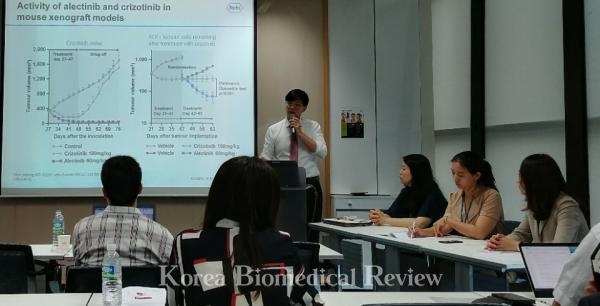Roche Korea is treading carefully in promoting Alecensa (compound: alectinib alectinib), which is highly likely to be registered as the primary treatment of Anaplastic lymphoma kinase(ALK) through global clinical trials. The reason: the Ministry of Food and Drug Safety (MFDS)식품의약품안전처 has recently strengthened its “off-label”-related regulations.
Currently, Xalkori (crizotinib) made by Pfizer화이자 is the only primary therapy in Korea to treat the disease.
Roche has confirmed the possibility of the drug as the primary treatment through Phase 3 clinical trials that compared Alecensa with Xalkori and is preparing to apply for approval. The clinical trials are the ALEX research released at American Society of Clinical Oncology(ASCO) early this month.

Roche is confident it has secured the basis as the first therapy because it compared Alecensa and Xalkori on 303 patients who hadn’t had any experiences of the treatment.
At a news conference at its headquarters Wednesday, however, Roche Korea unveiled the results of only Phase 2 clinical trials (NP28673, NP28761) on patients who had taken Xalkori while excluding results of the ALEX research. That was because although Alecensa got the approval as the secondary therapy in Korea, it has not won the approval as the primary treatment. Had it disclosed all research results; therefore, the company might have violated the ministry’s guidelines.
In February, the ministry set the guideline for the advertisement of prescribed drugs, disallowing drugmakers to promote unauthorized data even though they were announced in academic conferences, as such acts can lead to “off-label” prescriptions.
“We cannot officially distribute or deliver off-label data through press releases,” said an official at Roche Korea한국로슈. “We can only answer to verbal or written questions.”
Another official said, “If Alecensa hadn’t approved as the secondary therapy, the sharing of ALEX study wouldn’t have been an off-Label advertisement. As it had won the approval as the secondary treatment, however, the sharing of contents concerning initial therapy can be regarded as an off-label publicity.”
At the news conference, Roche Korea also said the ALEX research showed Alecensa was better than Xalkori regarding progressive-free survival (PFS) and the risk of cancer metastasis to the brain. In the comparative clinical trials, Alecensa showed PFS of 25.7 months and the metastasis risk of 9.9 percent while Xalkori showed comparative figures of 10.4 months and 41 percent, respectively.

